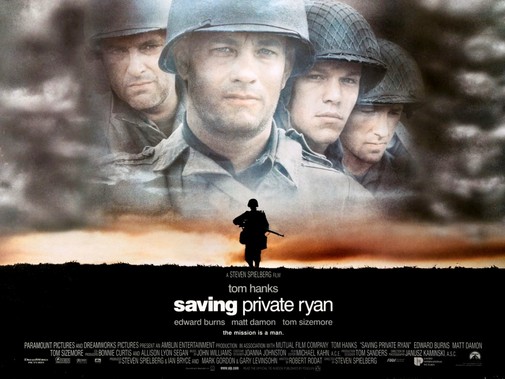As Oppenheimer enjoys tremendous success worldwide, another World War II movie turned summer blockbuster celebrates a quarter century. Though, of course, while Christopher Nolan's movie ponders history away from the battlefield, Steven Spielberg drops the viewer in the middle of carnage, violence smeared on your face until you can't take it anymore. Yes, it's been 25 years since Saving Private Ryan opened in cinemas, receiving immediate critical acclaim and frontrunner status by the awards pundits at most major publications. Come Oscar night, though, the war story took 'only' five awards. It lost the Best Picture trophy to Shakespeare in Love in an upset that angers many people to this day.
To mark the anniversary, let's celebrate the film's undeniable qualities, investigate some of its drawbacks, consider its competition at the 71st Academy Awards, and relitigate the controversy. Was Saving Private Ryan robbed? Well…
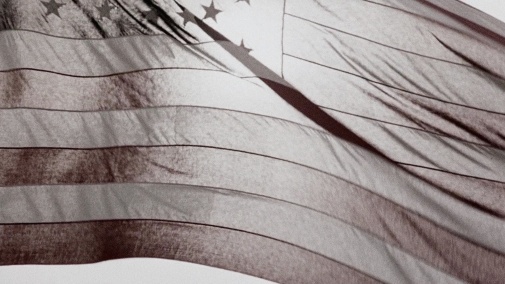
An American flag flaps in the wind, backlit into graphic array of black lines across the sun, an image of patriotism drained of red, white, and blue. In this singular vision, Spielberg seems to propose an exercise honoring American history while stripping it of romanticism. He and his crew valiantly erase nostalgia from bellicose memories to honor the men who fought in World War II. At the same time, however, the pull of sentimentalism will contradict that purpose as the film unfolds, never more than in the framing device this flag shot introduces. It's set in the Normandy Cemetery, around what one presumes was 1998, following an aged veteran as he pays tribute to his fallen brothers.
Whatever aesthetic mission Spielberg might showcase in the main action is absent at the margins, especially apparent in the meaning produced by the first transition to the past and the music underscoring it all. Simply put, John Williams was at the peak of his martial craze when he composed the score, combining the symphonic sentimentality of his usual fare with a militarist drive. The music is a propulsion of remembrance, embalming what's to come in signifiers that betray harsh truth – a melodic manifestation of Jingoistic nostalgia for the Greatest Generation. Thankfully, the schmaltz doesn't last long, the movie diving into a reality without song. It's time for the present dream to give way to past nightmares.
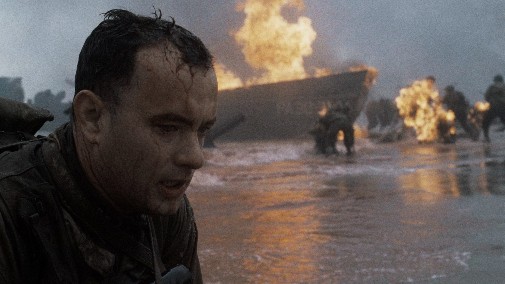
At over 20 minutes, the D-Day sequence at Omaha Beach is a perfect short film that encapsulates the best of Spielberg's craft, given a spin away from classicism. The director manages the chaotic violence like a conductor does their orchestra - notice the modulations of sound and tempo, how color thrills its own aria in plumes of red emerging within grey. In the midst, silence sings serene and crucial, as does the visual obstruction of objects, awkward angles, the elements revolting against celluloid like angry Gods of Old. It's a whirlwind of glorious grain, cinematic invocation doing double duty as a masterclass for audiovisual immersion.
The diabolic magic of it all is in how the filmmakers turn an experience always seen through the distance of historical document into a jolt of potent immediacy. Maestro Spielberg was in sublime form here, showcasing his ability to compose striking imagery while moving the camera through the scene. But that might be the movie's Achilles' Heel, even more damaging than the narrative frame. By delivering such a compact masterpiece early on, the director condemns the rest of the movie to cruel comparison – no matter how good the remaining hours of Saving Private Ryan may be, they never match the perfect Pandemonium of this opening salvo.
Moreover, there's an implicit attack on character-based drama within these movements, introducing bodies instead of personalities. Early on, Spielberg revolts against the war picture as winsome elegy, as a comforting institution that dares not question its basic tenets. No matter how kinetic he might make the sequence, it's never fun in the traditional sense, achieving a sort of punitive gravitas that dares the viewer to fall back into rosy notions of noble sacrifice. Then, it's over, and we're in the realm of Rockwellian Americana to set up the actual story, a direct contradiction of sorts.
In one gesture, Spielberg proposes a denial of romanticism. On the other, he can't help but indulge in it. Such discrepancies, creative impulses crashing in opposite directions, are part of what makes him a great filmmaker. In this case, they betray the work, dooming it to incoherence. That said, declaring Saving Private Ryan a failure would be a lie. The imperfections make it a more exciting piece to study and revisit than it might have been with a better script and other not-so-minor matters. Not to mention that, formalistically, the thing's a miracle full of radical strategies that still shock after decades of lesser imitators.
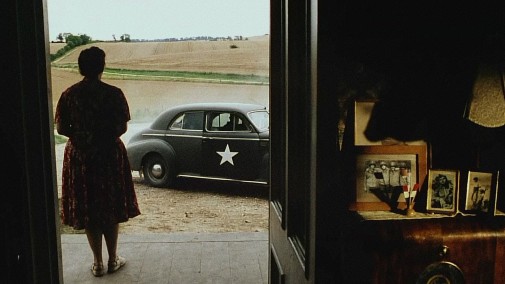
Cinematographer Janusz Kamiński has been with Spielberg since Schindler's List, and he's become something of a hindrance in the past few years, his style so inflexible as to be stifling, even when it's gorgeous to behold. By the time they made Saving Private Ryan, however, the erstwhile Mr. Holly Hunter was still open to experimentation, adapting to each new movie's demands, its possibilities. That's how we get this photographic triumph, which goes for hyper-realism before soaring above, reaching a state of utmost subjective agony. The sound is even better, caustic and nauseating, defining the physical parameters of every set piece until you believe you're trapped in there with the soldiers.
Oh, if only those men weren't so clichéd despite the efforts of a game cast. If only Spielberg could prolong the moral ambiguity of battle into the action interstitials. If only we could have stayed in the aftermath of bloody combat, forever stuck in painful memory. But no, the audience and the film must return to the framing device, to confront Saving Private Ryan's objectionable side. Pardon the grumblings, but I don't think acknowledging my problems with the movie erases its strengths, nor would it be right to feign a love I don't possess. Regarding 1998 Best Picture-nominated WWII movies, I'll take Terence Malick's The Thin Red Line, thank you very much.
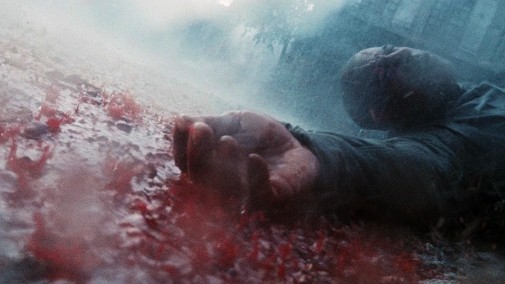
I'll go as far as saying that the Pacific Front poem is the true robbed queen among the nominees. What's more, Spielberg's Oscar bounty feels relatively fair for the film in question. The sound awards were rightly won, and it's hard to argue with Michael Kahn's editing when the structural issues are mostly script-based. Kamiński won Cinematography against The Thin Red Line's John Toll, which, while debatable, still seems eminently justifiable. The same goes for Spielberg's second Best Director win. Did it deserve more? I don't think so, though you might disagree. Looking over the categories it lost, other contenders seem superior.
Makeup went to Elizabeth, the queen's iconographic evolution trumping battlefield gore. Williams's score was the lesser of the five nominees, losing to Nicola Piovani's gorgeous Life Is Beautiful compositions. Tom Hanks also lost Best Actor to the Italian movie, and although I consider the American actor a better choice, he was far from being the lineup's standout – justice for Ian McKellen and Edward Norton! But then we have the other three races, and the matter grows uglier. Shakespeare in Love won Art Direction, Original Screenplay, and Picture against Saving Private Ryan, that last one a relative upset.
The causes for that are varied, but they fall primarily on one name, the elephant in the room of this entire piece - Harvey Weinstein. As the British film's producer and distributor, he was aggressive, going far beyond the shenanigans for which Francis Fisher and company got raked over the coals this past season. Not only did Miramax approach individual voters directly, but they also threw lavish parties, invested in FYC advertising with beastly obsession, and went as far as targeting the most vulnerable within the Academy, setting up screenings at nursing homes to get the vote of older factions.
Does that mean Shakespeare in Love is a rotten picture? Certainly not, for its literary playfulness is skillfully accomplished, designed to perfection, and performed by an ensemble far superior to Spielberg's uniformed fellows. Additionally, it's the rare comedy to win big at the Oscars in recent memory, making it a perfect target for those who complain about the Academy's stodgy taste while also seeing funny pictures as inherently lesser, not as important. Other factors helped facilitate the Shakespearean smash, including that old, vexing adage of release dates.
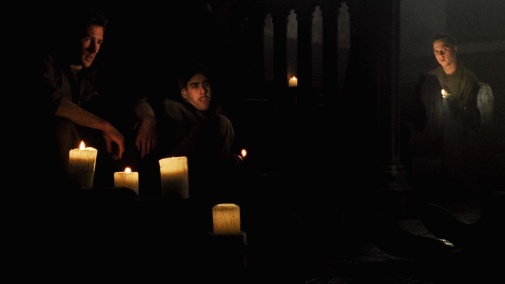
Spielberg opened his movie in the summer, while the future Best Picture winner waited until a December premiere, right in time to be on everyone's mind come Oscar voting. Then again, one can lay such strategic release decisions on Weinstein's feet, too. Going further into the weeds, it makes me uncomfortable to realize that part of my objections to Ryan's masterpiece status overlap with some of the badmouth lines Weinstein fed voters. Chiefly, that the D-Day sequence was great, but the rest of the movie failed to keep up.
In summation, the degree to which that odious man's campaign playbook led to a popular delegitimization of the awards can't be overstated, his influence hard to shake for the foreseeable future.
However, I personally refuse to condemn such fantastic cinema as Shakespeare in Love, The Piano or Carol, among others, because of this one individual. If you have other principles, that's valid, I understand and support you. Even so, regardless of your ultimate moral position, those who love cinema must mourn how polemic grew to mythic proportions, slotting each picture into narrative roles that overshadow their merits and demerits, their complexity as works of art.
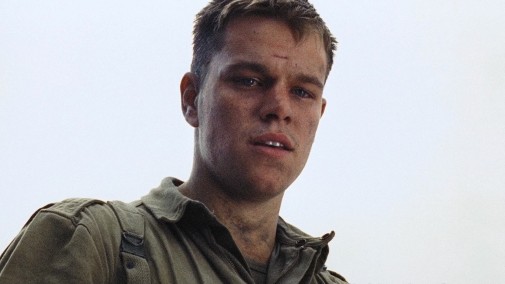
Spielberg's war picture became the slain David to Miramax's Goliath, the defeated hero against a villain wearing an unjustly-won crown in total perversion of mythic sense. In some twisted ways, Shakespeare In Love vs. Saving Private Ryan was the Barbenheimer of 1998. Only it wasn't a box office phenomenon. Instead, it was a race for gold, playing out in the awards season rather than in theaters proper, voters the adjudicators of legacy where audiences hold power in this year's viral story. Unlike the Gerwig-Nolan of it all, the '98 Oscar wars never developed in a mutually beneficial symbiosis, remaining adversarial and heartily contested forevermore.
At the end of all this, dear reader, what say you? Was Saving Private Ryan robbed or not?
